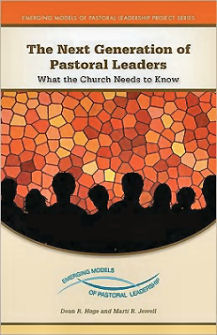
|
Posted April 26, 2010
Book: The Next Generation of Pastoral Leaders: What the Church Needs to Know Authors: Dean R. Hoge and Marti R. Jewell Loyola Press. Chicago, IL. 2010. Pp. 187 An Excerpt from the Jacket:
Looking closely at what hundreds of young Catholics think about the faith, what they like and don’t like about the Church, and other key issues on their minds today, The Next Generation of Pastoral Leaders should prove instrumental in guiding pastors and pastoral planners, vocation directors and ministry program directors, to a new way of visioning and developing strong future leaders in the Catholic Church. An Excerpt from the Book: This study call on the Church to adopt a new culture of vocations and a greater sense of cooperation and synergy between ministries. We simply cannot operate in separate worlds anymore. Those who work in ministries dedicated to increasing vocations, developing lay ecclesial ministers, and organizing the diaconate program need to work hand-in-hand with those who minister to college students and young adults in the diocese and in the parish. On a national level, we have seen great success from the partnerships that religious communities have had when they get involved with young adult ministry. Three major examples of this are the Paulist Fathers in New York City, who founded Busted Halo Ministries (www.bustedhalo.com), known especially for their incredibly interactive Web site for spiritual seekers, as well as their podcast, radio show, blogs, question boxes, Church search, and retreats; the Jesuits of the Chicago Province, who created Charis Ministries (www.charisministries.org), which developed a series of young adult retreats and days of prayer, now held around the country and all based on the Spiritual Exercises of St. Ignatius of Loyola; and the many local priests, deacons, and lay ministers who are actively supporting and shepherding the work of Spirit & Truth (www.sandt.org), an organized nationwide network of Eucharistic adoration communities begun in Atlanta and now flourishing in parishes, campuses, and dioceses from coast to coast. What this does is shift the paradigm to the way young adults “do Church” now in the twenty-first century. In decades past, vocations to lay, vowed, or ordained ministry would result from introducing young people to inspirational Church ministries in their local parish communities. But due to the clergy shortage and the busyness of life for many families, there are fewer opportunities for this kind of experience. However, when lay and diaconate formation directors and vocation coordinators for ordained and vowed communities cooperate alongside youth, campus, and young adult ministries, we might be able to regain and reclaim a new culture of vocations. The national organizations for youth ministry, campus ministry, and young adult ministry are already working harder to collaborate more effectively so that young people can walk a seamless road from one experience of Church to the next (instead of falling through the gaps between our ministry areas). Ideally we would keep that bridge continuing beyond young adulthood into a life of service and ministry in the Church. We can no longer live in the age of isolation; we must work together to help and support each other’s good work. So in addition to “praying for vocations” at Mass today, we can now add a new step: work at developing active campus and young adult ministries in our parishes and diocese where those vocations can take root. As someone who works with young adults, I can firmly state that the future isn’t just beyond the next decade; rather, it’s right here in front of us. The “next generation” in the title of this book isn’t coming one day, it’s already here. But there are three important questions I want to pose to those of us already involved in Church work. One, do we have good outreach ministries in place for collegians and young adults? Two, are we actively recruiting and offering invitations to young Catholics to greater leadership opportunities? And three, can we start thinking in new and creative ways to broaden our outreach and work hand-in-hand with one another? Table of Contents: 1. State of the Church in the Twenty-first century 2. Interest in lay ecclesial ministry 3. Interest in ministry as a priest, brother, sister, or deacon 4. The future of priests and lay ministers 5. Experiences of young lay ministers 6. Recommendations: the future of the Catholic Church Commentary Edward P. Hahnenberg Commentary Rachel Hart Winter Commentary Paul E. Jarzembowski |
|
